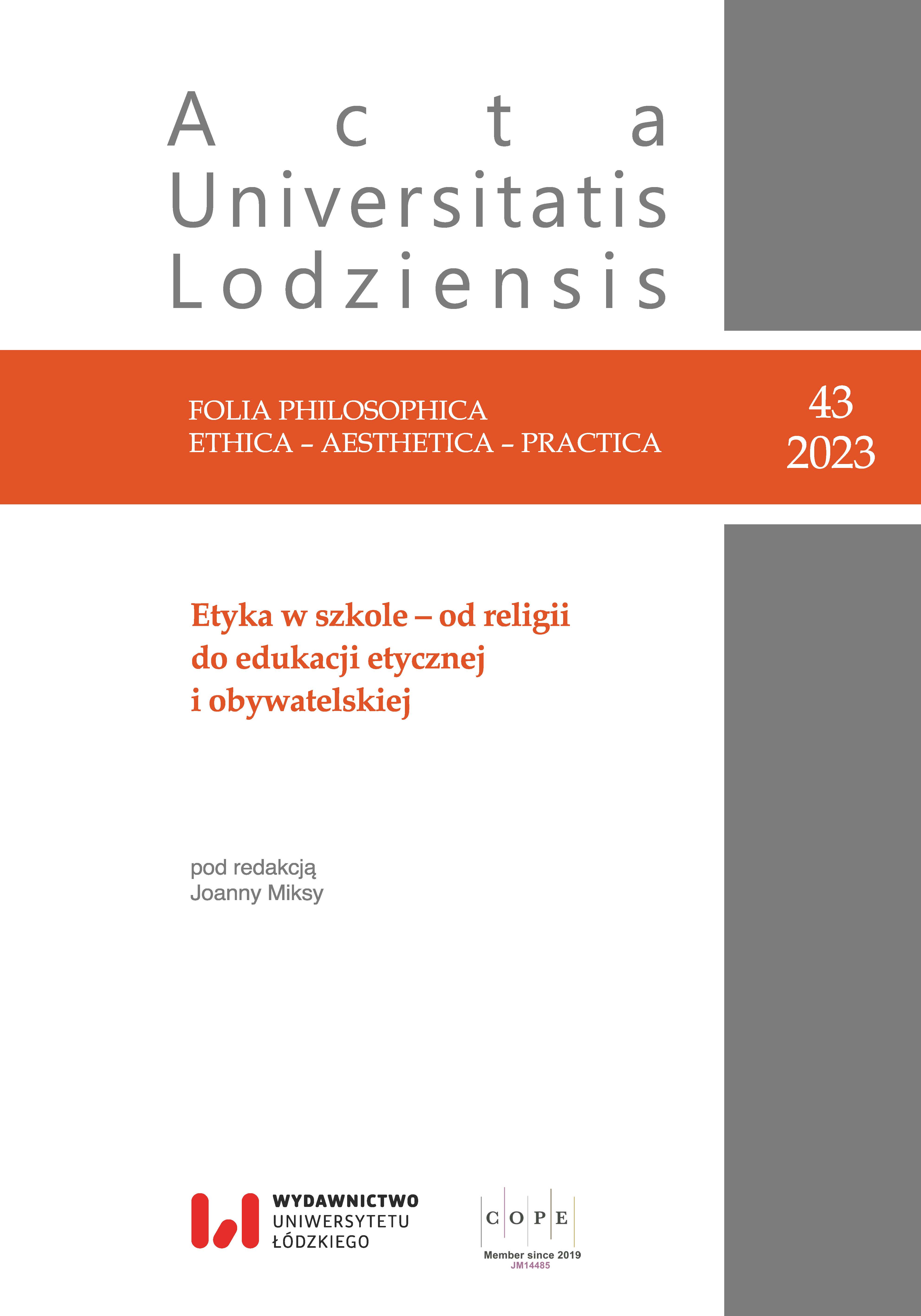Teaching Methods in Ethical Education in the Netherlands
DOI:
https://doi.org/10.18778/0208-6107.43.05Keywords:
teaching ethics in the Netherlands, scaffolding technique, methods of teaching ethics, effectiveness of practicing philosophyAbstract
The article presents the position of ethics in school education programmes in the Netherlands and the goals and the practice of teaching it. The article discusses the results of research conducted in Dutch schools, aimed at examining which teaching methods are best for developing students’ knowledge and skills. It is also important to determine which model of interaction between students and teachers is the most beneficial one? The study used forms of teaching based on the scaffolding technique. It is based on collective development of problems and philosophical discussion by organizing questions, searching for alternative answers and providing diverse examples. Observations gathered in research confirm the good effectiveness of this method, especially when the reasoning process is clearly structured, the structure of wrongly formulated questions is corrected and metaconcepts appear. A comparative analysis of selected lessons allows me to conclude that the choice of teaching form has a decisive impact on the level of students’ involvement and, consequently, on the development of their skills. The active participation of the teacher as a coordinator of the discussion, initiating the dialogue and giving it a logically clear structure is also important. For this reason, it is important that teachers conducting classes have proper philosophical and methodological background.
References
Alberts, R. V. J. i Erens, B. J. M. (2015). Verslag van de examencampagne 2015 voortgezet onderwijs. Online: https://cito.nl/media/3wgffiyp/cito_verslag_examencampagne_2015.pdf [dostęp: 23.12.2023].
Google Scholar
Aulls, M. W. (2002). The contributions of co-occuring forms of classroom discourse and academic activities to curriculum events and instruction. Journal of Educational Psychology, 94, s. 520–538.
Google Scholar
DOI: https://doi.org/10.1037//0022-0663.94.3.520
Carr, D. (2003). Making Sense of Education: An Introduction to the Philosophy and Theory of Education and Teaching. London: Routledge.
Google Scholar
Cerbin, W. i Kopp, B. (2006). Lesson Study as a Model for Building Pedagogical Knowledge and Improving Teaching. International Journal of Teaching and Learning in Higher Education, 18 (3), s. 250–257.
Google Scholar
Chin, C. (2006). Classroom Interaction in Science: Teacher Questioning and Feedback to Student’s Responses. International Journal of Science Education, 28 (11), s. 1315–1346.
Google Scholar
DOI: https://doi.org/10.1080/09500690600621100
Ebbens, S., Ettekoven, S. i Van Rooijen, J. (1996). Effectief leren in de les. Basisvaardigheden voor docenten. Groningen: Wolters-Noordhoff.
Google Scholar
Goucha, M. (2007). Philosophy, a School of Freedom: Teaching Philosophy and Learning to Philosophize; Status and Prospects. UNESCO Digital Library. Online: https://unesdoc.unesco.org/ark:/48223/pf0000154173 [dostęp: 24.12.2023].
Google Scholar
Havekes, H. G. F., Coppen, P. A. J. M., Luttenberg, J. M. i Van Boxtel, C. A. M. (2012). Knowing and doing history: A conceptual framework and pedagogy for teaching historical contextualisation. International Journal of Historical Learning, Teaching and Research, 11 (1), s. 72–93.
Google Scholar
DOI: https://doi.org/10.18546/HERJ.11.1.06
Kessels, J. (1989). Kennis van kennis. Een ontwikkelingsonderzoek in didactiek van filosofie. Utrecht: Innovatiefonds van de Rijksuniversiteit.
Google Scholar
Kessels, J. (2009). Philosophy for Children as Educational Reform. W: Marsal, E., Dobashi, T., i Weber, B. (red.), Children Philosophize Worldwide. Theoretical and Practical Concepts. New York: Peter Lang, s. 117–126.
Google Scholar
Kienstra, N. (2016a). Doing Philosophy is Learning a Language (The Pearl Model). Europa Forum Philosophie, 2016, s. 115–125.
Google Scholar
Kienstra, N. (2016c). Effectief filosoferen in de klas: Docenten zelf lesontwerpen laten maken in het schoolvak filosofie (Proefschrift Radboud Universiteit). Enschede: Ipskamp.
Google Scholar
Kienstra, N. i Van der Heijden, P. G. M. (2015). Using correspondence analysis in multiple case studies. Bulletin de Methodologie Sociologique (Bulletin of Sociological Methodology), 128, s. 5–22.
Google Scholar
DOI: https://doi.org/10.1177/0759106315596920
Kienstra, N., Imants, J., Karskens, M. i Van der Heijden, P. G. M. (2016b). Doing philosophy effectively: Student learning in classroom teaching. Online: https://www.ncbi.nlm.nih.gov/pmc/articles/PMC4574705/ [dostęp: 10.02.2016].
Google Scholar
DOI: https://doi.org/10.1371/journal.pone.0137590
Kienstra, N., Karskens, M. i Imants, J. (2014). Three approaches to doing philosophy: A proposal for grouping philosophical exercises in classroom teaching. Metaphilosophy, 45 (2), s. 288–319.
Google Scholar
DOI: https://doi.org/10.1111/meta.12085
Kienstra, N., van Dijk-Groeneboer, M. i Boelens, O. (2018). Religious-Thinking-Through Using Bibliodrama: An Empirical Study of Student Learning in Classroom Teaching. Religious Education, 113 (2), s. 203–215.
Google Scholar
DOI: https://doi.org/10.1080/00344087.2017.1403788
Kirschner, P. A., Sweller, J. i Clark, R. E. (2006). Why minimal guidance during instruction does not work: An analysis of the failure of constructivist, discovery, problem-based, experiential, and inquiry-based teaching. Educational Psychologist, 41 (2), s. 75–86.
Google Scholar
DOI: https://doi.org/10.1207/s15326985ep4102_1
Korthagen, F. A. J. (1985). Reflective teaching and preservice teacher education in the Netherlands. Journal of Teacher Education, 9 (3), s. 317–326.
Google Scholar
DOI: https://doi.org/10.1016/0742-051X(93)90046-J
Marsman, P. (2010). Vakdossier Filosofie. Enschede: SLO.
Google Scholar
Meester, F., Meester, M. i Kienstra, N. (2014). Durf te denken! Werkboek havo 4: Wetenschapsfilosofie. Amsterdam: Uitgeverij Boom.
Google Scholar
Oosthoek, D. H. (2007). Balans van 35 jaar filosofie in het voortgezet onderwijs in Nederland. Tijdschrift voor Filosofie, 69, s. 783–809.
Google Scholar
Thijs, A. i Van den Akker, J. (2009). Leerplan in ontwikkeling. Enschede: SLO.
Google Scholar
Van den Akker, J. (2003). Curriculum Perspectives. An Introduction. W: Van den Akker, J., Kuiper, W. i Hameyer, U. (red.), Curriculum Landscapes and Trends. Dordrecht: Springer, s. 1–11.
Google Scholar
DOI: https://doi.org/10.1007/978-94-017-1205-7
Van der Kooij, J. C., De Ruyter, D. J. i Miedema, S. (2013). "Worldview": the Meaning of the Concept and the Impact on Religious Education. The Official Journal of the Religious Education Association, 108, s. 210–228.
Google Scholar
DOI: https://doi.org/10.1080/00344087.2013.767685
Van der Leeuw, K. i Mostert, P. (1991). Filosofie-opvatting en onderwijsstijl. VIC Tijdschrift voor Filosofieonderwijs, 20 (1), s. 15–24.
Google Scholar
Van de Pol, J., Volman, M. i Beishuizen, J. (2010). Scaffolding in teacher–student interaction: A decade of research. Educational Psychology Review, 22, s. 271–296.
Google Scholar
DOI: https://doi.org/10.1007/s10648-010-9127-6
Downloads
Published
How to Cite
Issue
Section
License

This work is licensed under a Creative Commons Attribution-NonCommercial-NoDerivatives 4.0 International License.












